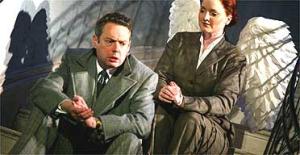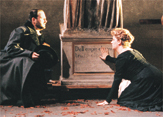Llandudno Again
14 June
So, for the fourth year running, I headed along the North Wales coast to Llandudno for some
opera by the sea.
 This year we had two operas. The first was a complete unknown to me - Handel's Jephtha -
a sacred oratorio written in the latter part of his life. The story is a classic one.
A leader makes a pact with a deity; should he achieve a great deed, he will sacrifice the
first thing he sees afterwards. It is someone close to him - in this case, his daughter.
You might think that the moral should be "Never make rash pacts with a deity". In this
case, the moral felt more like "There is a great cost for all greatness".
This year we had two operas. The first was a complete unknown to me - Handel's Jephtha -
a sacred oratorio written in the latter part of his life. The story is a classic one.
A leader makes a pact with a deity; should he achieve a great deed, he will sacrifice the
first thing he sees afterwards. It is someone close to him - in this case, his daughter.
You might think that the moral should be "Never make rash pacts with a deity". In this
case, the moral felt more like "There is a great cost for all greatness".
It was an evening of intensely expressive singing. Susan Bickley's Storgè was
spine-tingling in her anguish as the wronged mother. She was well matched by the inner
turmoil of Mark Padmore's Jephtha. As the two lovers, Iphis and Hamor, Sarah Tynan and
Daniel Taylor were fresh, alert and alive. Christopher Purves was a reliable Zebul.
Charlotte Ellett's angel was the only slight weak link. Paul McCreesh conducted
choir and orchestra like a demon. It was most moving and well worth four stars.
![[Four Stars - Excellent]](4.gif)
However, I have two quibbles. Given that the work lasted for less time than the
Don Giovanni of the following night, I don't understand the reasoning behind
a 6 o' clock start. It really did mess the day up.
The other quibble was the setting. The whole enterprise was directed by Katie Mitchell.
On the whole, I liked her directness in handling the
emotional conflicts. I liked the way the lovers felt as though they were lovers and the
way that the final parting was difficult for them. I liked the way public and private scenes
were differentiated. But why does she have to set everything in the 1950s? I've only ever
seen two other of her shows before - Jenufa
and Katy'a Kabanova and guess what? They were
both set in the 1950s as well.
The following morning over breakfast I read an article in The Independent about the politicisation
of the Venice Biennale. Later at the Mostyn Gallery, we took in an exhibition by Paul Seawright,
Wales's representative at the Biennale. The exhibition was of photographs taken of the Afghan
landscape drained of colour, drained of humans, scarred by war, bleak and empty. It chimed well
with the setting of the previous night's opera. It was good enough for three stars.
![[Three Stars - Good]](3.gif)
 We saw Mozart's Don Giovanni that night. Katie Mitchell directed this piece as well.
Guess the time period? You got it. 1950s again. However, this was a very good rendition
of the piece. Much more integrated than the better sung Covent
Garden production of last year. Well worth three stars.
We saw Mozart's Don Giovanni that night. Katie Mitchell directed this piece as well.
Guess the time period? You got it. 1950s again. However, this was a very good rendition
of the piece. Much more integrated than the better sung Covent
Garden production of last year. Well worth three stars.
![[Three Stars - Good]](3.gif)
In a well rounded cast, Geraldine McGreevy's Donna Anna was splendid and Garry Magee's
Don Giovanni was world class (I heard him sing this rôle with
Opera North a few years back). I liked the sound
of Peter Wedd's Don Ottavio and he took the few opportunities that there are to make
the character strong and forceful. Christopher Purves was a stalwart Commendatore and
the rustics, Zerlina and Masetto were well taken by Natalie Christie and Matthew
Hargreaves. Catrin Wyn-Davies was sort of alright as Donna Elvira but I didn't take to
Neal Davies' Leporello. Tugan Sokhiev conducted well - neither too sprightly nor too
lugubrious.
It was nice to see some familiar names over the two days. For example, Christopher Purves
took Papageno in WNO's The Magic Flute two
years ago and Sharpless in Madama Butterfly
last year and The Forester in Opera North's Cunning
Little Vixen at the Liceu. I've heard Geraldine McGreevy as Miss Jessel in
The Turn of the Screw, Vitellia
in La Clemenza di Tito and
Rosalinde in Die Fledermaus.
Natalie Christie was Eurydice in Orphée
et Eurydice, Pamina in The Magic Flute, Adele in Die Fledermaus
and Adina in The Elixir of Love. It's
good watching careers progress.
And it's good watching people improve. Peter Wedd was a much better as Don Ottavio
this year and Matthew Hargreaves was a much better Massetto this year than they were
Pamino and The Speaker respectively in The Magic Flute two years ago. And
presumably one of the reasons why the Giovanni felt like a performance was that four
of the main protagonists had worked before on a reasonable but not great Flute.
It's what companies are all about.
 This year we had two operas. The first was a complete unknown to me - Handel's Jephtha -
a sacred oratorio written in the latter part of his life. The story is a classic one.
A leader makes a pact with a deity; should he achieve a great deed, he will sacrifice the
first thing he sees afterwards. It is someone close to him - in this case, his daughter.
You might think that the moral should be "Never make rash pacts with a deity". In this
case, the moral felt more like "There is a great cost for all greatness".
This year we had two operas. The first was a complete unknown to me - Handel's Jephtha -
a sacred oratorio written in the latter part of his life. The story is a classic one.
A leader makes a pact with a deity; should he achieve a great deed, he will sacrifice the
first thing he sees afterwards. It is someone close to him - in this case, his daughter.
You might think that the moral should be "Never make rash pacts with a deity". In this
case, the moral felt more like "There is a great cost for all greatness". We saw Mozart's Don Giovanni that night. Katie Mitchell directed this piece as well.
Guess the time period? You got it. 1950s again. However, this was a very good rendition
of the piece. Much more integrated than the better sung
We saw Mozart's Don Giovanni that night. Katie Mitchell directed this piece as well.
Guess the time period? You got it. 1950s again. However, this was a very good rendition
of the piece. Much more integrated than the better sung